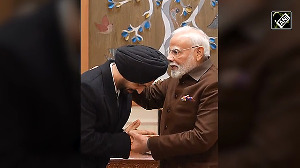Pakistan expressed concern over what it described as India's "massive" induction of advanced weapon systems and adoption of "offensive" military doctrines and said it would not compromise on the maintenance of a credible minimum nuclear deterrence.
The concerns were expressed when Premier Yousuf Raza Gilani chaired a meeting of National Command Authority for the first time after control of the country's nuclear arsenal was transferred to him by President Asif Ali Zardari one-and-a-half months ago.
The meeting reviewed "developments detrimental to the objectives of strategic stability in the region" and claimed that India was pursuing "an ambitious militarisation programme and offensive military doctrines" instead of responding positively to Pakistan's proposal for a strategic restraint regime in South Asia, according to an official statement.
"Massive inductions of advanced weapon systems, including installation of anti-ballistic missiles, build-up of nuclear arsenal and delivery systems through ongoing and new programmes assisted by some external quarters, offensive doctrines like 'Cold Start' and similar accumulations in the conventional realm tend to destabilise the regional balance."
The NCA discussed the India-specific exemption made by the Nuclear Suppliers Group and nuclear fuel supply agreements concluded by New Delhi with several countries and claimed this "will enable India to produce substantial quantities of fissile material for nuclear weapons by freeing up its domestic resources."
The meeting decided that Pakistan "will not compromise on its security interests and the imperative of maintaining a credible minimum deterrence" while it continued to act with responsibility and avoid an arms race.
The NCA noted "recent Indian statements about its capability to conduct conventional military strikes under a nuclear umbrella" and claimed such "irresponsible statements reflected a hegemonic mindset, oblivious of dangerous implications of adventurism in a nuclearised context."
Pakistan's civil and military leadership has been very critical of Indian army's new doctrine which includes scenarios such as a two-front simultaneous war with both China and Pakistan.
The Pakistani military establishment has also been wary about several big-ticket defence deals that have either been concluded by India or are in the pipeline.
The NCA also claimed India's "relentless pursuit of military preponderance will have severe consequences for peace and security in South Asia" and the Indian Ocean region and "Pakistan cannot be oblivious to these developments."
The meeting said the promotion of non-proliferation and disarmament objectives in South Asia is linked to "regional security dynamics and the need to address existing asymmetries and resolution of outstanding disputes."
The NCA meeting also reviewed plans for civil nuclear power generation under International Atomic Energy Agency safeguards as part of a national energy security strategy to ensure economic growth.
"As a country with advanced fuel cycle capability, Pakistan is in a position to provide nuclear fuel cycle services under International Atomic Energy Agency safeguards and to participate in any non-discriminatory nuclear fuel supply assurance mechanism," the statement said.
The meeting expressed satisfaction at steps taken by Pakistan for nuclear safety and security. As a nuclear weapon state, Pakistan will work as an "equal partner in international efforts for general and complete nuclear disarmament and non-proliferation," the meeting decided.
In this regard, the NCA called for "non-discriminatory policies and accommodation of the reality of Pakistan's nuclear weapon status for promoting global non-proliferation goals." It reaffirmed Pakistan's policy of restraint and its resolve to continue efforts to promote peace and stability in South Asia.
It also called for "prevention of conflict and avoidance of nuclear and conventional arms race in the region."
Referring to the Conference on Disarmament in Geneva, the sole disarmament negotiating forum, the NCA said Pakistan's position on a possible Fissile Material Treaty will be determined by its national security interests and objectives of strategic stability in South Asia.
"Selective and discriminatory measures that perpetuate regional instability, in any form and manner, derogate from the objectives of nuclear disarmament and non-proliferation and therefore cannot be accepted or endorsed.
"Pakistan will not support any approach or measure that is prejudicial to its legitimate national security interest," the statement said.







 © 2025 Rediff.com -
© 2025 Rediff.com -